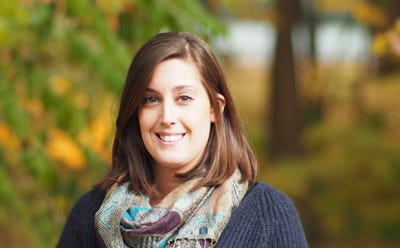Mejia Bridges Gap Between Athens’ Customers and Operations Team
Amanda Mejia, a 2019 Waste360 40 Under 40 award recipient, discusses RecycLA and the issues surrounding that program, as well as her philanthropic work.
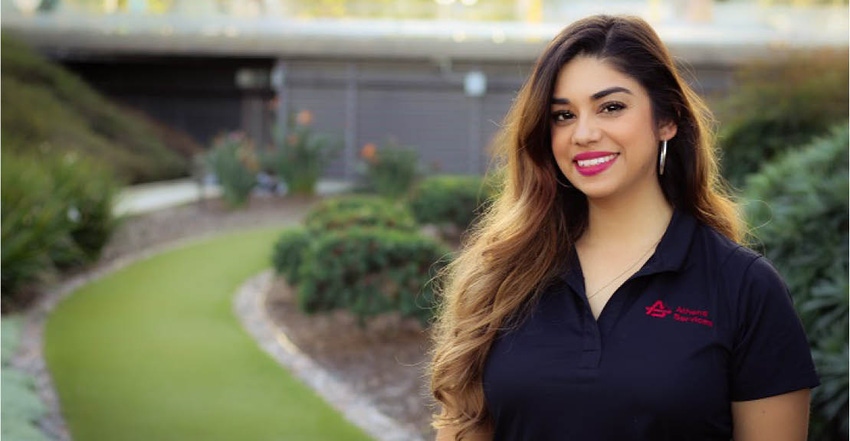
Amanda Mejia, Athens Services’ government affairs manager, helped the company during the implementation of the largest commercial waste franchise in the United States, RecycLA in Los Angeles.
Mejia started out as a zone waste manager, supervising a team of recycling coordinators who conducted outreach and education to customers in Los Angeles. Shortly after the transition period ended, she was promoted to a government affairs liaison for the RecycLA contract, where she continues to support city staff and is a bridge between customers and Athens’ operations team.
In her free time, Mejia has taken on a number of philanthropic initiatives in her community.
“Amanda attributes her career and personal successes to her pay-it-forward mentality,” says Eric Romero, Mejia’s coworker. “She believes in giving back to her community and does so by volunteering and organizing philanthropic activities for youth in the Los Angeles area. Inspired by the young women attending underserved high schools in her community, Amanda founded Prom Dresses to Give. Nearly four years ago, she began with the simple thought to collect formal dresses, use her car trunk as storage and drive to high schools across Los Angeles to allow girls to select their special dress for prom. After the first year of collecting dresses, an overwhelming response from donors led to her creating a fun-filled community event that included a shopping experience for the young women to enjoy with their friends and family. Upcycling formal dresses from residents across Los Angeles, [the initiative] has collected approximately 400 dresses and served more than 250 high school students across Los Angeles. Through this organization, she hopes to inspire and encourage local giving among her peers, as well as the young women she serves.”
We recently sat down with Mejia, a 2019 Waste360 40 Under 40 award recipient, to discuss RecycLA and the issues surrounding that program, as well as Prom Dresses to Give and other philanthropic initiatives she is involved with.
Waste360: How did you begin your career in the waste and recycling industry?
Amanda Mejia: I started during the time Los Angeles approved the largest franchise in history, RecycLA. Prior to being employed at Athens, I was the former Eastside field deputy for Los Angeles Mayor Eric Garcetti. My knowledge of RecycLA was very minimal, but I had a slight idea of the program. As a field deputy, I was well aware of an array of issues impacting the communities in our city, including trash and illegal dumping. I was not familiar with the industry, but as I was seeking opportunity for growth, I stumbled across the opportunity to support Athens during the transition of RecycLA. I was hired as a zone waste manager, leading a group of recycling coordinators who were responsible for transitioning new Athens RecycLA customers.
Waste360: Please discuss how you helped Athens adjust to the RecycLA program.
Amanda Mejia: The outreach implementation period of RecycLA was critical to the success of the program. As a former deputy to the mayor, I was well versed on community engagement. For Athens, this was a significant benefit since I not only had an understanding of community outreach, but I also was attuned to the other issues people were facing as it related to the city.
My experience working with folks during transitions related to policy complemented the company’s current needs, especially given that the transition was a challenge as customers were not pleased with the rollout of the program. As a zone waste manager, I was in a position to shape our outreach efforts—training our top employees (recycling coordinators) to become field workers and to transition thousands of customers. As part of the transition, recycling coordinators were responsible for educating customers on the RecycLA program. Many customers expressed their frustration with the program and lack of knowledge of such a huge transition. In order to best serve our customers, our outreach team had to be well trained in approaching customers, answering questions and dealing with high-intensity situations such as refusals from customers who did not want to be part of the RecycLA program. My role contributed to ensuring the recycling coordinators had the support needed to best serve our customers during this challenging time.
Waste360: Describe your role as government affairs manager at Athens Services.
Amanda Mejia: As the government affairs (GA) manager, I essentially serve as the frontline worker representing Athens Services in the city of Los Angeles. My main role is to be the liaison for the council districts in our service zones—Athens works closely with seven council members. As GA manger, I am responsible for ensuring that our council offices have direct contact with Athens, which entails quick response times for their staff and their constituents. Additionally, I meet with council staff to discuss RecycLA-related questions and issues in depth so there is a mutual understanding of the ordinance. The council office staff serves as a great connect to the communities Athens services. Their insight and direction on key community and political groups has supported the advancement of our commitment to continue past the RecycLA transition.
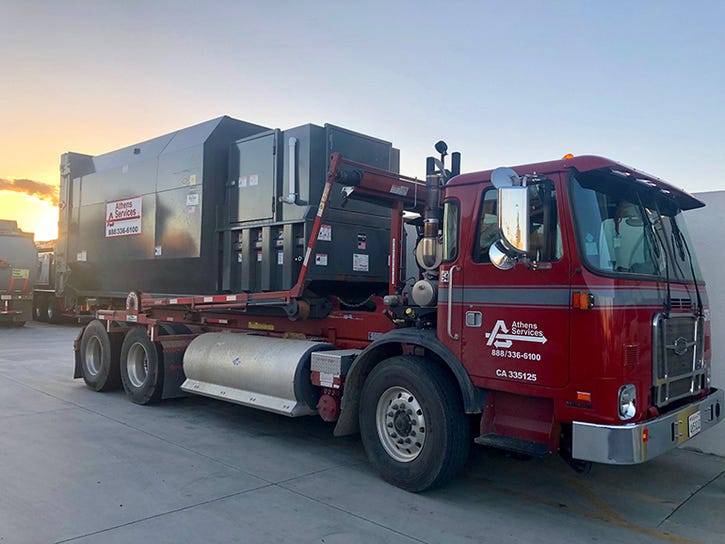
I am also involved with the implementation of community affairs, taking lead on connecting with key leaders in the community, business improvement district groups, the Chamber of Commerce, neighborhood councils, etc. With the support of the council, I have made countless connections and attended a number of meetings to introduce Athens into the communities we serve. Additionally, these meetings have served as an avenue to provide RecycLA-related information to customers, support the transition and build partnerships moving past the transition. There also have been opportunities to educate folks on RecycLA, clarify information for customers, answer pending questions and solve issues that customers may be dealing with at their properties. All of that has been extremely beneficial to building stronger relationships with our customers.
My role as GA manager is significantly important but also very unique. Meshing my former experience in the public sector with my private sector experience, I am better able to understand customers and, more importantly, work with them moving forward. Often times, I am approached by our customers in a state of shock. Many folks often believe that the private sector is not interested in their concerns or needs. So, approaching them with a listening ear makes a world of a difference, and it changes their perspective on how Athens Services operates.
Waste360: It was recently announced that some changes will be put into place for fees associated with RecycLA. What impact will those changes have on Athens and its customers?
Amanda Mejia: That is correct—the city and haulers have recently agreed on a few changes to be made to RecycLA. On our end, Athens took the initiative to do our best to work with customers during the transition. There were a couple of pieces of the contract that came into question during the transition—many of which were related to fees.
At Athens, our leadership worked closely with the outreach team to ensure that customers were charged fairly. We had regular conversations on the impacts certain fees were making on the participation levels of our customers as it pertained to recycling. Many of the changes being made to fees associated with RecycLA will have a positive impact on Athens customers. Prior to the changes, there were ancillary fees associated with recycling—scout fees and access fees—and the new changes being made to RecycLA are a positive step in the right direction for everyone. Customers will no longer have fees associated with their recycling services, and therefore will promote interest in participating in such services.
A number of customers expressed confusion and frustration with the access to recycling services. Although recycling was presented to customers at a “no charge,” distance and access fees proved otherwise when applied. This was a huge setback for the program, as hundreds of customers, if not thousands, refused recycling due to the ancillary fees. Multifamily units and businesses were not accepting recycling based on the ancillary fees; at times, the program became irrelevant to customers. Now, the conversation has changed, and customers are more willing to accept recycling services at no cost. Despite the changes made to the program, customers have continued to express their frustration as it relates to costs of the program. Nonetheless, this is a step in the right direction.
A rising challenge that both Athens and customers have come across relates to the lack of infrastructure in place for customers to access recycling or any additional services. A significant number of customers are not able to access more trash, recycling or organics services due to the limited space granted at their multifamily units or businesses. As we continue to build in the city, it’s going to be critical that we begin to implement waste services in our planning process.
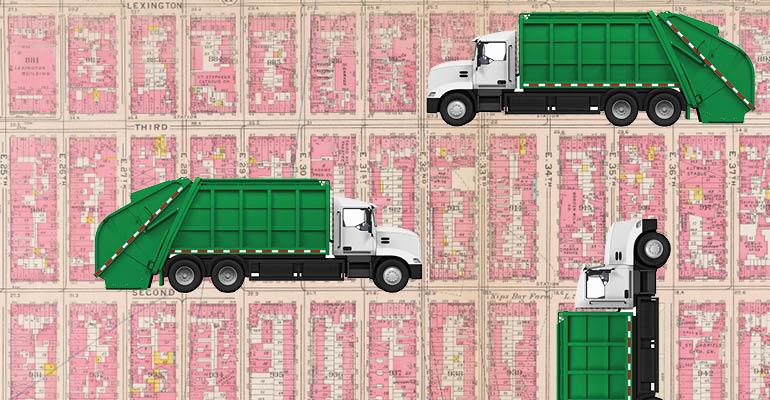
4. Commercial Franchise Zones Explained
I believe New York is trying to implement such a program. I think it would be extremely helpful if they gain insight from Los Angeles; for starters, dissecting the city’s infrastructure and accounting for all the customers that will be transitioned into the program. There needs to be an effective system that can document existing and new customers. One of the biggest challenges during the outreach phase was accountability. Being able to identify customers and track them through a system is critical to the success of the transition of the program and beyond. In addition, companies should have well-trained individuals who are ready to provide the upmost customer service.
Waste360: Please tell me about Prom Dresses to Give and how you started that event.
Amanda Mejia: This is where I kind of fell into the industry without knowing it. About four years ago when I was working in the mayor’s office, I was working with youth. My memory draws a blank, but for some reason I thought of the issue, “girls not being able to purchase a prom dress due to financial hardships.” My solution was to write a post on Facebook to call on all my social media friends to donate a formal gown to a girl who may need one for prom.
So, there I go, collecting dresses out of the trunk of my little Honda Civic. After my collection period, I would then use my current relationships with local schools to identify the need for dresses at each school. I coordinated with the principals and drove to the schools identified to meet with the girls in the classroom, so they could try on dresses and pick their prom dress. Not so flattering, I decided that after my first year of working on this project, there was a larger need, so I created an event. Born and raised in Boyle Heights [Los Angeles], I decided to work with a local organization (Puente Learning Center) to host a community event. This event is driven by community, so it was very important that I worked within the community I feel a part of. It’s also imperative to build a sense a community for others. That led me to our process for gathering dresses.
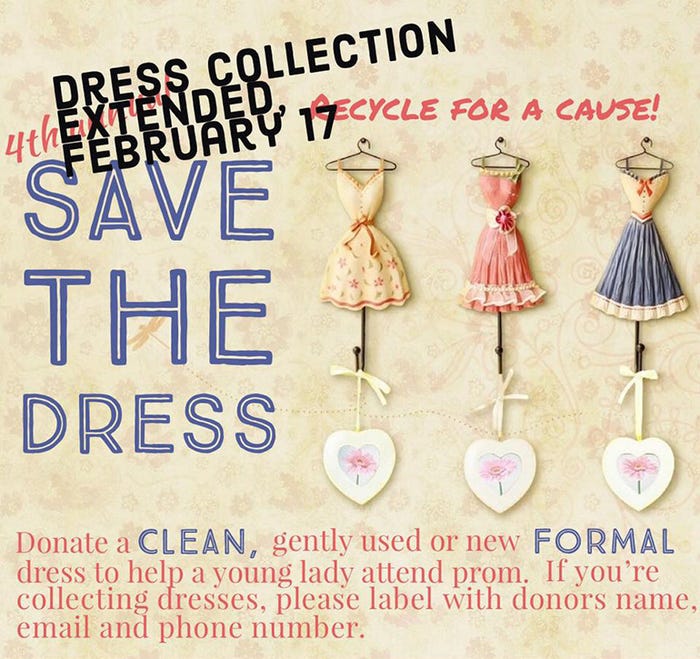
As previously mentioned, the way in which we outreach to the public is via social media. A flyer is made for collection of the dresses, times for exchanges are scheduled and the storage is based out of my family’s home. Dresses do not have to be new—we’re recycling dresses, or you can say upcycling dresses from people who no longer need their dress but also don’t know where to donate them. Being new to the industry, I’ve learned that people don’t really know where to donate clothing. So, when it comes to formal gowns or prom dresses, people become excited to learn of our program. Sometimes dropping dresses off at a donation site does not bring gratification to someone. Through Prom Dresses to Give, what’s great is that we take photos of the girls as they take the dresses and a thank you card is written to the donor of the dress. People actually can see that their dress has been given to a deserving girl ready to enjoy in time for prom.
The success of the program goes to the community. I also must say we have now grown our sponsorships to include Athens Services and other local businesses. Over the years, with everyone’s support, we have been able to collect more than 600 dresses and given out more than 300 hundred dresses to girls throughout Los Angeles.
Through Prom Dresses to Give, we hope to continue to inspire local giving throughout Los Angeles. Our motto is that “to generate giving in your community, it doesn’t take a million dollars. Something as simple as a dress can make a world of difference for someone who may not have anything to wear on such a memorable night.” Lastly, we want to encourage our recipients to give back by recycling their dresses to give to another girl the following year. Many of the girls have begun giving their dresses, and this has been the ultimate gift to our program—the cycle of giving.
Waste360: Can you discuss other philanthropic activities and organizations you are involved with?
Amanda Mejia: I am still involved with many organizations based in my hometown, the Eastside of Los Angeles. In addition, Athens has provided me the opportunity to extend my philanthropic work representing the company. The company is involved in giving back to the communities where we provide service, including participating in community outreach events, monetary or food donations, etc.
Two other yearly events that I participate in and hold close to my heart are the city of Los Angeles’ homeless count and EmBrase Foundation 5K. Each year, the city goes out in communities across Los Angeles to count the homeless population. The accuracy of counting our most vulnerable population is critical to the funding that is given to the city so that we may find shelter for our homeless population. For this reason, I find it extremely important to participate each year. The second event, the EmBrase Foundation 5K, is a community foundation that is focused on giving scholarships to local youth attending college in addition to funding local arts and dance programs for youth at Plaza De La Raza.
Lastly, I enjoy mentoring our local youth. In my former position in the mayor’s office, I led the Mayor’s Youth Council, a group of high school students (specifically living in the Eastside) who volunteered to be advocates of their communities. Many of these students spent every weekend with me volunteering with established organizations that would host events. I still mentor a number of students who have now graduated and attend some of the most prestigious colleges. I am so proud of them all.
Waste360: What are some of the challenges you’ve faced through your career thus far?
Amanda Mejia: One of the biggest challenges that I have faced in my career—and sometimes refrain from speaking about it—is the fact that I look very young and often may not be perceived as a professional. It’s not so much a problem in the business aspect itself with coworkers, but it’s mainly been with customers/constituents.
The types of questions or comments I normally receive range from: “You are so young, what can you do for me?” “Oh, you look so young.” “Wow, you handled that very professionally, I’m impressed.” “I’ve probably been dealing with this issue longer than you’ve been alive.”
The only challenge or internal battle I have is the fact that I must accept that folks may not trust me when they initially see me/meet me. Presentation is key, especially when I am not able to meet everyone at a single meeting. It’s important that when I present to a group of people, I nail it.
I have learned from my experience of working in the city and now Athens that not everyone will “like” you—but I will find a way to work with you. Usually once folks understand my work ethic and I communicate my willingness to support their needs, they understand that age and years of experience is no longer a deal breaker. My passion to help others is shown through my work, effective communications skills and ability to solve problems.
Waste360: What kind of mark do you hope to leave on the industry?
Amanda Mejia: The kind of mark that I hope to leave on this industry is building communities through innovative relationships. This unique private-public partnership between the city of Los Angeles and Athens will not only prove that it is possible but also necessary. Imagine the resources and innovative ideas that may be implemented into communities when the private and public sector work together. You can see it now through the food recovery program where Athens is supporting local nonprofits to establish their programs by providing funds that are used to create long-lasting infrastructure or meet their current needs/modifications.
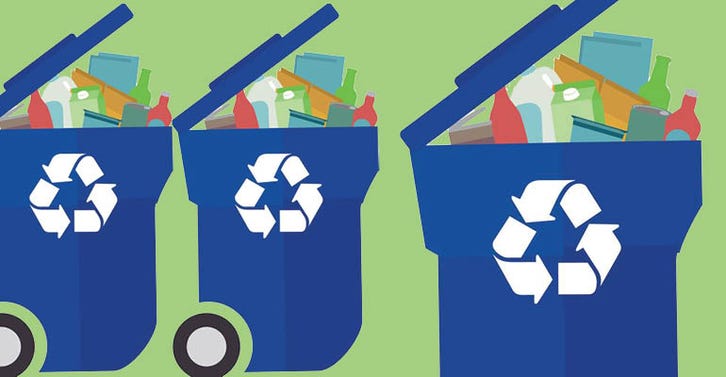
As a former city employee, when you talk about building communities through innovative relationships, you’re talking about making connections where companies may not otherwise do so. When you have someone who has the experience of both private and public sector and is willing to utilize that experience to the best of their ability to find ways to make things happen for everyone, the odds of people not wanting to participate in such program are no longer against us. I understand that I may not be significantly impacting or increasing the number of recycling customers, but at the end of the day, I am working on issues impacting our day-to-day as a company—issues that are also related to the city and take both experiences to understand that many of these issues are more complex than people want to believe (i.e. homelessness encampments). Ultimately, the benefits of building relationships with the customer base and the city are critical to the success of the program for everyone.
Waste360: Outside of work, what do you like to do in your free time?
Amanda Mejia: I like to sleep [laughing]. I enjoy outdoor activities, hiking, running and attending art/food festivals. I will say that I am probably not a normal 29 year old; I don’t go out much, but Disneyland is my hangout. I appreciate being surrounded by community and people who are really empowered to make a difference in their personal and professional life. Whenever I am free, I support friends and volunteer at local events in the community.
When you’re in this type of field, I’ll be honest, sometimes you just want a break from talking to people. So, it’s nice to just be in silence.
Waste360: Do you have any advice for someone new looking to join the industry?
Amanda Mejia: You don’t necessarily need to be experienced to join the industry. You just need to be passionate and ambitious to learn the industry. At first, I had no clue what a “three-yarder” was. I knew what a bin was, but I didn’t know the sizes of the bins. I had no idea what service levels meant or how to balance services for trash, recycling and organics. So, if you don’t know the industry, this is a great opportunity for you. The industry has changed my lifestyle; I now carry around my own utensils and own a “cool,” reusable straw. I use reusable bags now when I go to the market. I feel great knowing that I am positively contributing to a better environment.
Although there has been a shift in learning new information, I have found an appreciation for learning in the workplace. The best place to learn a job is out in the field. My advice to anyone is if you’re new and looking for a new opportunity and growth, this industry provides you with an opportunity to learn, grow and not only impact your professional life but also your personal life.
About the Author(s)
You May Also Like

